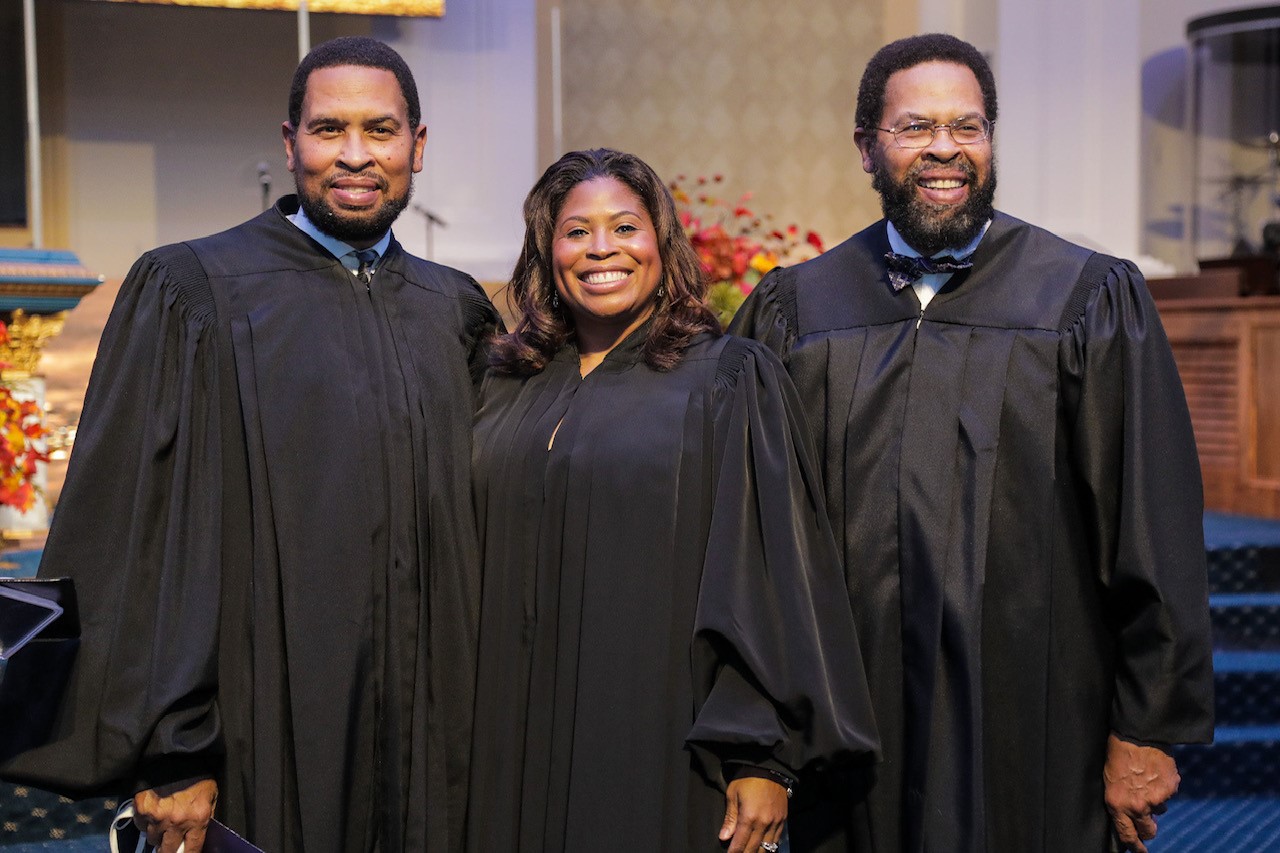
There are plenty of families with multiple generations of judges; you can read about two of them on the other pages of this report.
But you won’t find many with multiple generations serving at the same time in the same district and in the same courthouse.
You will if you visit the 19th Judicial District Courthouse in Baton Rouge, Louisiana.
On the eighth floor you’ll find the office and courtroom of Chief Judge Donald R. Johnson. In October of 2023 he will complete his 30th year on the bench.
Across the hall is his identical twin brother, Judge Ronald R. Johnson, who began his fourth year on the bench in 2023 after 36 years in private practice.
On the ninth floor, directly above Judge Donald Johnson’s office, is Judge Eboni Johnson Rose, Ronald’s daughter and Donald’s niece. She was elected to the district court in December 2020.
“I don’t think it’s ever happened before,” Judge Donald Johnson says. “There’s nothing that we could find where there were two brothers on the same court and then they added an extension – in this case the daughter of my brother. That’s never happened.”
The Johnson Judicial Dynasty didn’t come about by accident. There were two key precursors.
One was the Supreme Court of the United States’ decision in Clark v. Roemer (1991). Black lawyers in Louisiana sued the state for violations of the Voting Rights Act in judicial elections. The resulting consent decree led to a redistricting plan that created Black-majority voting districts. All judges in Louisiana are elected, meaning the Johnsons’ story is not one of nepotism.
The redistricting, combined with more recent demographic changes, led to the election of more African American judges. In the reconstituted 19th District, they now account for 9 of the 15 seats.
The other precursor was a Johnson family tradition of educational achievement, at least of late.
A TV reporter doing a feature on the trio after the younger Johnson’s election mentioned that Donald and Ronald grew up poor.
“Dirt poor,” Judge Donald Johnson corrects.
Their father, an Army vet, worked for the Baton Rouge Water Company, repairing meters and supervising a section of Black employees. Their mother worked mainly as a maid. She later served as a court bailiff. Their family consisted of 11 children: seven boys, four girls. Ronald and Donald were in the middle.
Though neither of the parents went to college, they stressed the value of education. The twins took this to heart more than any of their siblings. Not all of them went to college; two were incarcerated.
The Johnson children mostly attended segregated schools. But the twins talked it over and decided to join a small group of other Black students and integrate the all-white junior high school and later the high school.
“I remember being the only Black in a number of my classes,” Judge Ronald Johnson says. “No one spoke to you for at least the first two six-week periods. So you had to develop strength…. I think we developed a tenacity out of that environment that we were going to succeed in spite of it.”
The brothers both earned engineering degrees from a Historically Black College or University (HBCU), Southern University in Baton Rouge. Donald studied mechanical engineering, Ronald engineering technology. Two years later, Donald called his brother to say he had decided to go to law school. Ronald decided he’d go, too. Donald attended Louisiana State University Law School. Ronald attended the Southern University Law Center across town.
They say they were both inspired to pursue legal careers by the struggle for civil rights they’d witnessed growing up. During their freshman year as undergrads at Southern University, two of their fellow students were killed during a demonstration.
“That was a very critical year for us, a very defining moment,” Judge Ronald Johnson recalls.
Judge Donald Johnson now has seven degrees, including both the master’s and the doctorate in judicial studies offered by the University of Nevada, Reno (UNR) in cooperation with the NJC. Since 2004, he has completed 60 NJC courses as well as teaching in a handful.
Judge Ronald Johnson completed six NJC courses in his first three years on the bench.
Judge Johnson Rose had done four and was working toward her master’s in judicial studies from UNR.
“You don’t see this every day,” she says of the three of them all making it to the bench. “It really is a testament to the fact that my dad and my uncle really stressed education in our family – like to the utmost. My dad – all of his children have graduated from college. Most of us have advanced degrees…. They really believe that if you can get an education, the sky is the limit.”
All three judges also give thanks to the NJC for helping them build their careers.
“When I came there, I realized that for me it was the best judicial education I could get,” says Judge Donald Johnson. “The College set me in the direction of becoming a super achiever in terms of my judicial education and in putting that into practice when I got back.”
If not for his NJC experience, he says, he would have been narrowly focused on Louisiana law and the state’s traditional ways of operating courts. Instead, he learned what other courts around the country were trying, took that knowledge back to Baton Rouge, and became a change agent.
He helped introduce a pre-trial drug-treatment court and a domestic violence court, and he supported a program to help with the re-entry of prisoners’ back into society. His brother Ronald was preparing to launch a veteran’s treatment court in fall 2023.
This is not to say that everything is deadly serious between the brothers.
Interviewing them together via Zoom from their offices across the hall from each other quickly turns into a game of brotherly trash talk, although one-sided.
Judge Ronald Johnson acknowledges his brother’s 25-year-plus head start on the judicial careers of himself and his daughter. “He was the frontrunner on all of this,” he says earnestly. “We are trying to come in behind him and fill in the gap.”
“He’s never going to catch up,” his brother responds. “He can just dream about it.”
Judge Ronald then tries to explain that he and his brother were very competitive growing up. They challenged each other to do their best. He thinks that benefitted them both.
Judge Donald dryly says he agrees with this “for the most part.”
“Ron was always trying to out-achieve me, and I was always showing him that he couldn’t do that. He was never going to be able to get up to my level.
“Each time I learned something, I taught him what he didn’t knew … so he was always getting more (knowledge) because I shared mine, and he kept his to himself. So he wound up, according to him, being the smartest fellow out there. I let him assume that.”

Hon. Diane J. Humetewa, the first Native American woman and the first enrolled tribal member to serve as a ...

Retired Massachusetts Chief Justice Margaret H. Marshall has been selected as the 2024 winner of the presti...

Dear Gaveliers Fans: I am delighted to announce the appointment of our first Gaveliers coaches, profiled...

Fans, I could not be more proud of the work our players put in over the summer. The difference between h...

As the 2024 Election moves in to its final weeks, just over half of trial judges who responded to a survey ...